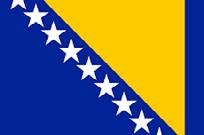
3 minute read
Independent Magazine - issue 12
IFAD and the Government of Bosnia and Herzegovina successfully model a public, private and producer partnership for linking smallholder farmers to markets
The Rural Competitiveness Development Programme in Bosnia and Herzegovina (RCDP) presented a public–private partnership model that effectively linked smallholder farmers to value chains and high-value markets. According to the project performance evaluation (PPE) report published by the Independent Office of Evaluation of IFAD (IOE), the programme was able to secure the active support and engagement of local authorities and private sector actors in identifying and mobilizing smallholder farmer groups.
The design gave thorough attention to connecting farmers to market opportunities identified by business leaders, which ensured that targeted farmers had secured markets before production using contract farming. This approach achieved a win-win scenario between farmers and business leaders, whereby farmers benefited by gaining access to subsidized starter packages, technical support and high-value markets while business leaders benefited from predictable supply and volumes at required market standards.
Approved on 12 December 2015, the programme became effective on 16 March 2017 and was completed on 31 March 2022. This was the first PPE undertaken by IOE in the country. The goal of RCDP was to contribute to sustainable rural poverty reduction in the country. The development objective was to enable smallholders to take advantage of the development of the fruit, vegetable, non-timber forest product and other potential subsectors.
In addition to the public–private partnership model, other successes achieved by the project include the establishment of cluster stakeholder platforms (CSPs). The platforms facilitated private and public engagement to strengthen overall agribusiness sector engagement. This was an innovative approach, which proved useful for reaching even very poor, scattered regions with extension support and markets. Moreover, the CSPs possess the necessary organizational capacity to validate and agree on key priority actions for cluster development.
Other notable findings include the fact that net household income increased 30 per cent while total agricultural production increased by over 50 per cent, and no farmer groups reported losses. Of the 101 producer organizations and cooperatives supported, 86 improved their productive and/or marketing assets.
The PPE also revealed areas requiring further attention, including the readiness of CSPs to self-sustain as institutions. CSPs require sufficient funding, at a minimum, to keep their cluster manager on the payroll and to finance their operational activities. Without further financial support from IFAD, the functionality of many of these platforms is unlikely to continue.
In addition, the innovative nature of the programme was not supported by effective monitoring and evaluation. There was no systematic collection of evidence to track and monitor subsector value chain performance, which the project design report. envisaged as an important area for
Looking ahead, the evaluation recommends that IFAD provide a clear long-term strategy to ensure continuity of its support to rural poverty eradication in upper-middle-income countries, such as Bosnia and Herzegovina. The evaluation also notes that the Government should develop systems to track value chain performance and governance arrangements for established multi-stakeholder platforms.
Bosnia and Herzegovina is an upper-middle-income country. Poverty remains a concern, particularly in rural areas. The poverty headcount ratio showed 17 per cent of the population living on less than 60 per cent of median national income, a lower value than in many countries of Central and Eastern Europe. Agriculture is an important sector of the economy of Bosnia and Herzegovina in terms of its contribution to employment and socio-economic development of the rural poor. The sector’s share of GDP has been in the range of 5.6-5.7 per cent from 2017 to 2021.










